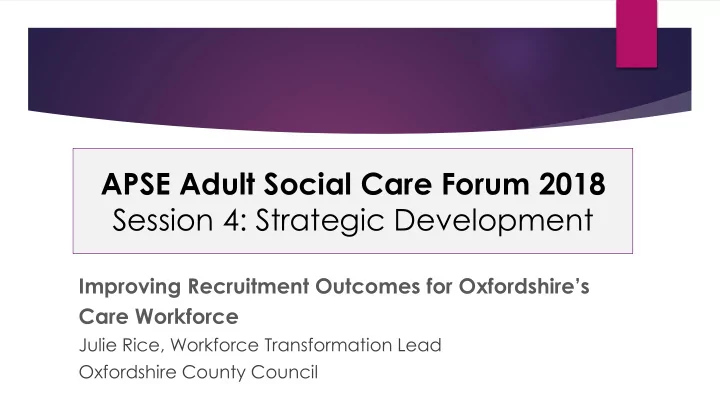

APSE Adult Social Care Forum 2018 Session 4: Strategic Development Improving Recruitment Outcomes for Oxfordshire’s Care Workforce Julie Rice, Workforce Transformation Lead Oxfordshire County Council
The Oxfordshire context One of the least affordable places in the country to live Very low unemployment - strong competition with other sectors Requirement for own transport in rural areas Workforce dispersed across a large number of providers Rapidly ageing population & declining working age labour force
Workforce challenges Recruitment from a limited potential pool of staff Pay and other recruitment levers are not enough alone to attract staff The financial cost of low retention is huge New ways of working/transformation Leadership, organisational and skills development
The Oxfordshire Approach Workshops with System Leaders - August 2017 and January 2018 Unregistered Workforce agreed Task and Finish Groups; A. Workforce Recruitment, Identity and Branding B. Retention, valuing staff initiatives and Keyworker Housing C. Skills and Leadership , Mentoring, Career pathways, sector passport Establishment of Joint System Workforce Board Evaluation of Recruitment Campaign and next steps Value Based Recruitment Workshop with Providers
The Oxfordshire Approach Strategic Workshop - Key Worker Housing agreed Task and Finish Groups Key Worker Definition Innovation and Best Practice Workstream Working in Partnership with Providers and Estate Agents (Short term opportunities) Bringing in Investors, Entrepreneurs and other key People across the System Short term delivery (i.e. next six months) electric cars, staff discounts DoHSC visit with System Leaders Provider Association and Conference National profile Co-chair ADASS Workforce Policy Board Submission for APSE Service Award
Make a difference every ry day Healt lth and Social l Care recruit itment campaign
Objectives Policy Communications Increase in job applications Increase understanding of care as a rewarding, flexible career path Increase understanding of care work Targets: Demonstrate partnership working on workforce and other system issues 5000 clicks to OACP website e.g. DTOC. Reach of 60k on social media Develop further insight for joint 8 items of significant media coverage recruitment brand project 40% recall of campaign 30 face-to-face contacts at each recruitment fair (3 scheduled)
Strategy Digital PR Series of stories: campaign launch, workforce OACP jobs page with NHS jobs and report stats; ‘Thank you’ for working at tracking software Christmas Facebook ads Advertising Google Display network ads Bus, external poster and radio (Heart FM) Eshots Posters, leaflets & banners - hospitals, libraries, Partners’ enewsletter (staff, stakeholders children & family centres inc. MPs and Councillors) SEO improvements and other Events improvements made to OACP website to Carers/jobs fairs (3 scheduled) improve Google ranking ‘Make a difference’ OACP award
Examples
Social media
OACP website
Impact 84 job applications Digital ads: 2.4m “impressions” 107 job seekers registering 200,000 reached on Facebook (target = 60,000) >10,000 visits to the website (target = 5,000) Total reach of 260,000 people 20 items of significant media coverage Campaign recall of 23% (quarterly OCC (target = 8) residents telephone survey
Campaign conclusions Very positive partnership working Far exceeded objectives for PR, digital and website clicks ‘Make a difference’ message is appealing and motivates web clicks Facebook is a cost-effective way to reach target audience Strong engagement of Christmas working story – suggests public support Significant increase in job application rate via OACP ( 3/month => 17/month )
Values Based Recruitment Pilot: Values Based Recruitment and Interviewing (VBR/I) Values based recruitment training courses and materials National development project with Supporting overhaul and development of values based approaches toolkit: e.g. values and behaviours framework
Varied challenges To attract, develop and retain quality workers Too many applicants without the The People wrong right qualities leaving people Not enough applicants Urgency Lots of to recruit vacancies Can recruit but people don’t stay very long
An holistic approach Induction Website Probation External and internal Training communications Supervision ‘Mission’ statements Performance Adverts management Open days Targeting Self-selection Values interviews Application forms Psychometrics Job descriptions & Assessment tools/ person specifications centres Pre-screening Assessor training questionnaires Shortlisting
Values and behaviours-based recruitment and retention (VBR) How is VBR different? Competency-based recruitment Values-based recruitment Scenario-based questions – Real-life examples – ‘Tell me about • • ‘What would you do if…’ a time when…’ Finding out more about a Finding out more about a • • candidate’s skills , talents and candidate’s values , including abilities behaviours and attitudes
VBA- Link to the national picture ADASS aim to develop and make available information, advice and training to support VBR/I in the adult social care sector a very positive partnership - led by Oxfordshire CC with South East ADASS and Skills for Care; supported by the Chief Inspector at CQC Our achievements Social care providers and key employees equipped with the knowledge and skills needed to implement VBR/I Skills for Care now established as the go-to place on VBR/I Skills for Care committed to continue training in partnership with councils Core work which WF ADASS Group champions in the sector Next phase within ADASS Regional WF Plan
Themes and next steps for VBA Key themes from April workshop: Variability in use and approaches – not “one size fits all” and support for smaller organisations Golden thread: importance of embedding values across the organisation, not just in recruitment Benefits of peer support: within and beyond organisations – action learning sets and buddying Strong desire for further practical work to support VBA across health and care Next steps: Identified learning to share from across the system: e.g. Oxford University Health leading further work Action planning session with providers, and regional and national partners: June 2018 Decisions on future investment, support and allocation of responsibilities between partners Provider Value Based Approach survey results
Thank you for listening JULIE.RICE@OXFORDSHIRE.GOV.UK TEL: 07756726159
Recommend
More recommend